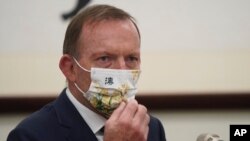Former Australian Prime Minister Tony Abbott says Australia should do more to support democracies like Taiwan as China asserts its influence across the Asia-Pacific region.
In a fiery keynote speech earlier this month at the government-backed Yushan Forum in Taipei, Abbott warned that internal problems within China might lead Beijing to lash out at Taiwan. Just days before his trip, China sent a record 149 flights into Taiwan’s Air Defense Identification Zone (ADIZ) between October 1 and October 4.
He said Taiwan’s “friends” need to show their support now more than ever as “nowhere is the struggle between liberty and tyranny more stark than across the Taiwan Strait.”
While no longer in office, Abbott’s speech attracted attention for his loud and vocal support of Taiwan, an unusual move for any former leader due to Taipei’s diplomatic isolation.
Prime Minister Scott Morrison has stressed that Abbott was traveling as a “private citizen” although he was received by President Tsai Ing-wen ahead of his speech on October 8 and was also allowed to bypass quarantine protocols.
Since leaving office in 2015, Abbott has focused on trade advocacy and has most recently begun to drum up support for the Comprehensive and Progressive Agreement for Trans-Pacific Partnership. The CPTPP is the successor to the failed Trans-Pacific Partnership and key signatories include Australia, Singapore, Japan, Canada and Mexico.
Recently, Abbott has called for Taiwan’s inclusion in the trade bloc, a point he further stressed during his speech at the Yushan Forum despite the potential that the move would anger Beijing.
China has squeezed Taiwan out of most international forums although it belongs to the World Trade Organization as the “Separate Customs Territory of Taiwan, Penghu, Kinmen and Matsu” and competes in the Olympics as Chinese Taipei. Taipei previously said it fears that if China joined the CTPP first it would block its membership.
Despite Abbott’s outspoken comments, his visit to Taiwan falls in line with the general direction of Canberra, whose relationship with China has become acrimonious Australia called for an inquiry into the origins of COVID-19.
Australia does not formally recognize Taiwan’s government, but it has maintained close and “discrete” ties over the years but has recently become more vocal about its support, said Brendan Taylor, professor of strategic studies at Australian National University’s Strategic & Defence Studies Centre.
“While the Morrison government’s position is perhaps not as stark as that articulated by Abbott while he was in Taiwan, there were certainly clear points of consistency, especially the emphasis given to values and freedom as well as the parallels highlighted between the current period and the strategic environment in the 1930s,” Taylor said.
A major difference, however, was Abbott’s repeated use of the word “country” in his speech to describe Taiwan, a word that is seldom used in English language discourse due to Taiwan’s disputed political status.
In September, Australia’s foreign affairs and defense ministers and their American counterparts issued a joint statement expressing “their intent to strengthen ties with Taiwan, which is a leading democracy and a critical partner for both countries,” Taylor said.
Australia has also helped to revive the Quadrilateral Security Dialogue (QUAD) in September with the United States, India and Japan, which also included discussion of the Taiwan Strait.
The safety of the 180-kilometer-wide waterway has been in the global limelight since 2020 as Beijing continues to send record numbers of military flights towards Taiwan.
“Australia has become much more concerned about Indo-Pacific security in recent years,” said Mark Harrison, senior lecturer in Chinese Studies at the University of Tasmania. “Up until the late 2010s, Australia’s interest in the region was dominated by a trade policy agenda but with Beijing’s assertiveness, that emphasis has shifted.”
Security issues are not the only reason why the government might be interested in Taiwan. Australian Trade Minister Dan Tehan recently met online with Taiwanese officials to discuss trade relations, Harrison said.
Taiwan cannot replace China as a destination for Australian exports, but it does buy products like coal, natural gas, and iron ore, Elliott Charng, a representative of the Taipei Economic and Cultural Office in Australia, recently told a parliamentary committee. Expanding trade, he said, could also allow Australia greater access to Taiwan’s important semiconductor and electronics industry as well as consumer goods like bicycles and motorcycles.




